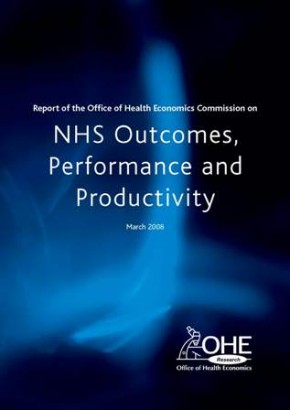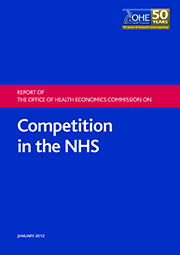Sign up to our newsletter Subscribe
Analysing Global Immunisation Expenditure

Sign up to our newsletter Subscribe


PROMs are intended to fill a critical gap in understanding the impact of health care on the patient’s quality of life. OHE is closely involved in PROMs research and policy discussions. Health care accounts for a significant portion of economic…

PROMs are intended to fill a critical gap in understanding the impact of health care on the patient’s quality of life. OHE is closely involved in PROMs research and policy discussions.
Health care accounts for a significant portion of economic activity in all medically advanced countries. In the UK in 2007/8, for example, slightly more than 18% of government spending was on health care. Policy makers and taxpayers naturally want to know what value patients receive, i.e., whether the output is commensurate with the input.
Measuring productivity and value in health care is not easy. Many once-deadly diseases have been transformed into chronic diseases, making measures of mortality very poor indicators of value for most diseases. Clinical outcomes can offer a more nuanced set of measures, but also fall short in one important aspect: measuring the impact of health care on the patient’s overall quality of life, during and after diagnosis and/or treatment.
Measuring value in health care is a key focus of OHE’s work. We are closely involved now in promoting and facilitating the routine use of patient-reported outcomes measures (PROMs) in health care. A PROM is a series of questions about patients’ own assessments of their health and health-related quality of life. (They do not include questions about patients’ satisfaction or experience with health care services, or seek their opinions about the success of treatment.)
OHE began its contribution on PROMs with the OHE Commission on NHS Outcomes, Performance and Productivity. The Commission included a panel of senior experts in economics, medicine, epidemiology, management and policy — and the viewpoints of the public and private health care sectors, professionals, patients and the general public. The purpose of the Commission was to review the evidence, commission research where necessary, and determine what patient outcomes data could and should be routinely collected and analysed by the NHS.
In its report, released in 2008, the Commission commended the Department of Health for including in its 2008/9 Framework requirements for PROMs for four types of surgical procedures. It noted, however, that it was both practical and desirable for the NHS to go much further than, and soon. The Commission concluded that processes for collecting PROMs data reasonably could be in place within five years for the majority of NHS activities. The report also offers recommendations about where to focus initially and what measures to emphasise.
OHE’s Continuing Involvement in PROMs
Continuing OHE involvement in PROMs is led by Prof Nancy Devlin, Director of Research at the OHE. A summary of her recent publication with the King’s Fund will appear in a subsequent post and we will be reporting regularly on new developments. Both Nancy Devlin and Adrian Towse are on the Department of Health’s PROMs stakeholder reference group and are working with the DH to ensure the success of the groundbreaking PROMs programme introduced in the English NHS in 2009.
An error has occurred, please try again later.
This website uses cookies so that we can provide you with the best user experience possible. Cookie information is stored in your browser and performs functions such as recognising you when you return to our website and helping our team to understand which sections of the website you find most interesting and useful.
Strictly Necessary Cookie should be enabled at all times so that we can save your preferences for cookie settings.
If you disable this cookie, we will not be able to save your preferences. This means that every time you visit this website you will need to enable or disable cookies again.
This website uses Google Analytics to collect anonymous information such as the number of visitors to the site, and the most popular pages.
Keeping this cookie enabled helps us to improve our website.
Please enable Strictly Necessary Cookies first so that we can save your preferences!


